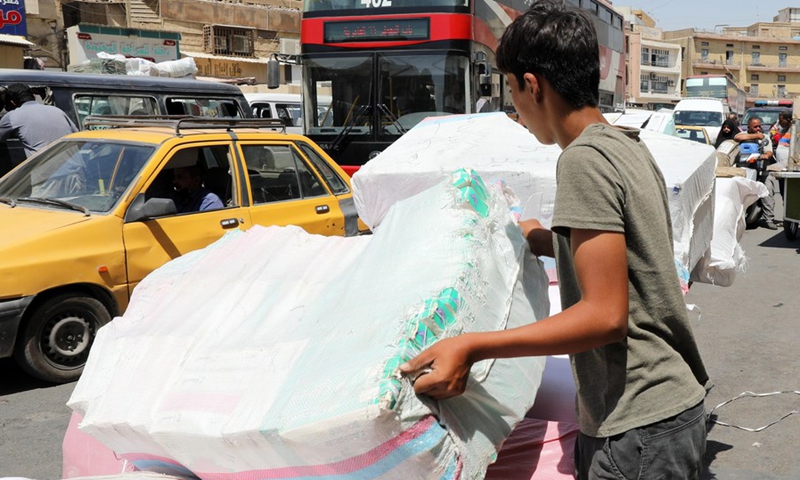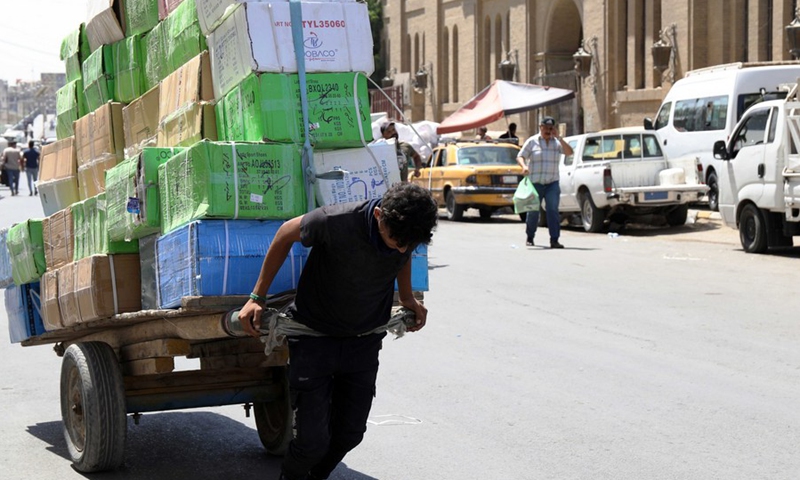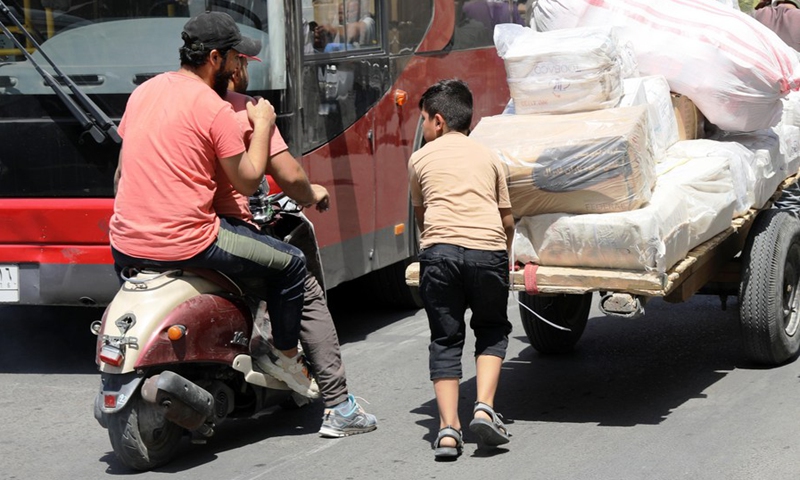
A boy loads goods onto a cart in al-Rasafi Square in central Baghdad, Iraq, on Aug. 29, 2022.(Photo: Xinhua)

A boy makes ice cubes for sale in a market in central Baghdad, Iraq, on Aug. 29, 2022.(Photo: Xinhua)

A boy pulls a cart loaded with goods in al-Rasafi Square in central Baghdad, Iraq, on Aug. 29, 2022.(Photo: Xinhua)

A boy pushes a cart loaded with goods on al-Rasafi Square in central Baghdad, Iraq, on Aug. 29, 2022.(Photo: Xinhua)
On a hot summer day in downtown Baghdad when the temperature reached 45 degrees Celsius, Ahmed Saad, 10, stood on the sidewalk of the al-Rasheed Street, selling bottled water and small bags of ice cubes to passers-by and nearby shop-owners.
Saad wakes up every morning in the poor al-Fadhil neighborhood in the Iraqi capital to work to earn money for his family.
It is not uncommon to see underage girls and boys, such as Saad, selling goods in Baghdad's crowded streets and markets, pushing carts to deliver goods, or unloading the trucks.
This is just part of the rising child labor problem in the war-torn Iraq, where the number of children forced to work is increasing due to the decline in Iraqi families' incomes caused by the political chaos and economic woes.
"We are a five-member family and live in a room rented in an old house. I have to help my father, who is a daily wage worker. I gain, sometimes 5,000 Iraqi dinars (about four U.S. dollars)," Saad told Xinhua.
"I left school in the 3rd grade and went to work to help my father because his income is not enough for the family," he said sadly.
Muthanna Ibrahim, 12, usually works in the nearby al-Shorja market in central Baghdad, pushing carts to deliver goods unloaded from trucks parked on the al-Rasafi Square to the wholesale stores.
He has been working to help his mother to support the six-member family, including four younger brothers, since his father died of cancer two years ago.
"The work here is hard, but what should I do? I have to help my mother, who bakes bread from morning to evening, to feed my younger brothers and help them complete their studies," Ibrahim told Xinhua.
Many Iraqi families choose one of their sons, usually the eldest son like Ibrahim, to quit school to work so that his younger brothers could complete school studies for a better future.
Mohammed al-Qaragholi, a retired engineer, told Xinhua that child labor is rejected because it deprives the children of education and increases their risk of exposure to dangers, including exploitation by drug and terrorist gangs.
"The reason for child labor is that our country has witnessed wars, displacement, and sectarianism. All these problems have become a pressure factor on families. The government must help these people and put them on the right path," al-Qaragholi explained.
He warned that working children face many risks, including the spread of drugs, urging the government to focus on scaling up social protection and increasing investments in public services such as education, health and child protection.
Ali al-Obaidi, a lawyer, told Xinhua that the Iraqi labor law sets a minimum working age of 15, and prohibits children from dropping out of school and engaging in activities that degrade their dignity.
"The government must pay very, very much attention to this issue (child labor) because the building of the nation depends on building the next generation. If one (of these children) is in the street, he will be subject to harassment and vulnerable to being exploited in terrorist operations," al-Obaidi said.
He slammed the lack of public awareness and the government's tolerance for the rise in child labor in Iraq, which has never restored normal life since the U.S. invasion in 2003 that opened the Pandora's box of chaos, violence, and sufferings for the Iraqi people.
In June, the International Labor Organization (ILO) and the UN Children's Fund (UNICEF) in Iraq said in a statement that "children make up the majority of 4.5 million Iraqis who are at risk of poverty due to the impact of conflict and COVID-19, with one in two children (48.8 percent) facing a high risk of multiple deprivations in education, health, living conditions, and financial security."
"Child labor has been on the rise in Iraq in recent years due to armed conflict, displacement, socio-economic challenges, and the pandemic; children were moved to remote learning, increasing the risk of dropping out of school and entering the workforce," the statement said.
It warned that depriving children of their childhood and education would expose them to the risks of serious hazards, illness and exploitations.
